
Event 116
Norma Percy, Oleksii Réznikov and Tim Stirzaker talk to Misha Glenny
Putin vs the West: At War
– Global Stage
Read moreAmerican filmmaker Norma Percy’s documentary series Putin vs the West aired a second series this year. At War looks at the first year of the full-scale war in Ukraine, through the eyes of the Presidents and Prime Ministers who had to deal with it, including Volodymyr Zelensky, Boris Johnson, Rishi Sunak, the head of the CIA and the UN Secretary General.
Series Producer Norma Percy, former Ukraine Defence Minister Oleksii Réznikov and the director of the series Tim Stirzaker discuss the show and what is happening in Ukraine with investigative journalist Misha Glenny.
Hay Festival Lviv BookForum Series supported by Open Society Foundations

Event 117
Jean-Baptiste del Amo, Munir Hachemi and Sara Mesa talk to Max Liu
Great Books From Continental Europe
– Meadow Stage
Read moreTake a trip around Europe through the work of three writers in translation. Jean-Baptiste del Amo’s The Son of Man (translated by Frank Wynne) sees a man reappear in the life of his wife and their young son and take them to the dilapidated house in the mountains where he grew up with his ruthless father. Living Things by Munir Hachemi (translated by Julia Sanches) follows four recent graduates who travel to the south of France to work the grape harvest, but end up working on an industrial chicken farm. Sara Mesa’s Un Amor (translated by Katie Whittemore) is about Nat, who arrives in an arid rural village in Spain following a cryptic mistake. They speak with writer Max Liu.
Supported by AC/E Acción Cultural Española

Event 121
Leo Murray and Andrew Simms
Badvertising
– Wye Stage
Read moreEvery day we’re sold a dream life through adverts: sun-soaked holidays, beautiful interiors, perfect home-brewed coffees. We consume goods like there’s no tomorrow, and if advertising continues as it is, that might indeed become true. Leo Murray and Andrew Simms, authors of Badvertising: Polluting our Minds and Fuelling Climate Chaos, raise the alarm about an industry that is making us both unhealthy and unhappy, and that is driving the planet to the precipice of environmental collapse in the process. They address the psychological impact of being barraged by thousands of adverts a day, how commercialisation of public spaces weakens our sense of belonging and what we can do to change things for the better.

Event 125
Theresa May talks to Samira Ahmed
The Abuse of Power
– Global Stage
Read moreAs Home Secretary for six years and Prime Minister for three, Theresa May confronted a series of issues in which the abuse of power led to devastating results for individuals and significantly damaged the reputation of, and trust in, public institutions and politicians. From the Hillsborough and Grenfell tragedies to the Daniel Morgan case and parliamentary scandals, the powerful repeatedly chose to use their power not in the interests of the powerless but to serve themselves or to protect the organisation to which they belonged. The Abuse of Power: Confronting Injustice in Public Life is May’s searing exposé of injustice and an impassioned call to exercise power for the greater good. The former prime minister argues for a radical rethink in how we approach our politics and public life, in conversation with BBC broadcaster Samira Ahmed.
Sponsored by Hillandale Caravan Parks
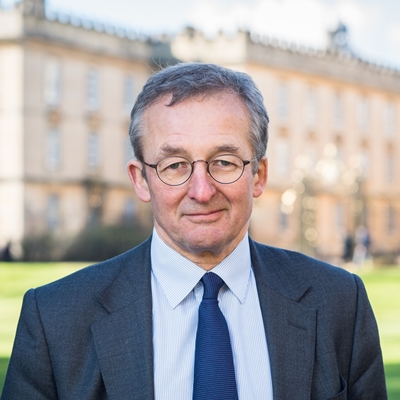
Event 132
Dieter Helm
Legacy: How to Build the Sustainable Economy
– Discovery Stage
Read moreWhat would a sustainable economy look like? How could we live within our environmental means? Sir Dieter Helm explains what it would take to properly maintain different types of capital, why polluters would have to pay, why the current generation would have to fund the necessary maintenance of our natural assets and why we would have to save to invest. Author of Net Zero and The Carbon Crunch, Helm is Professor of Economic Policy at the University of Oxford. From 2012 to 2020 he was Independent Chair of the UK Natural Capital Committee, providing advice to the government on the sustainable use of natural capital. His latest book is Legacy: How to Build the Sustainable Economy and he is in conversation with Mark Lloyd, CEO of The Rivers Trust.
Sponsored by With Intelligence
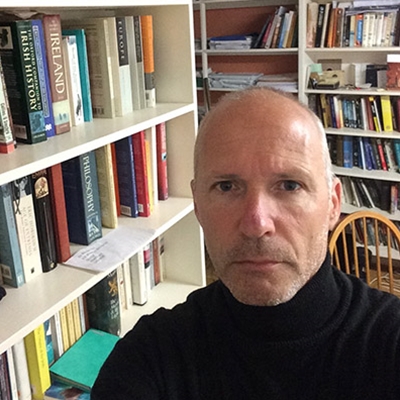
Event 134
Diarmait Mac Giolla Chríost
Celtic Palestine: Culture and Conflict
– Meadow Stage
Read moreJoin Professor Diarmait Mac Giolla Chríost for an illustrated talk about his new book, Fieldnotes from Celtic Palestine. He shares reflections on his field visits to Palestine over several years, including encounters such as being served tea by the daughter of a Hamas suicide bomber in the family apartment in Ramallah, and being taken to Jewish settlements regarded as illegal under international law. He explores aspects of the conflict in Palestine through the medium of art, casting a critical eye upon depictions of Gaza by the Welsh artist Osi Rhys Osmond and upon portrayals of the West Bank in the creative writing of Irish novelist Colum McCann. Chríost is Director of Postgraduate Research Studies at the School of Welsh, Cardiff University.
In association with Cardiff University
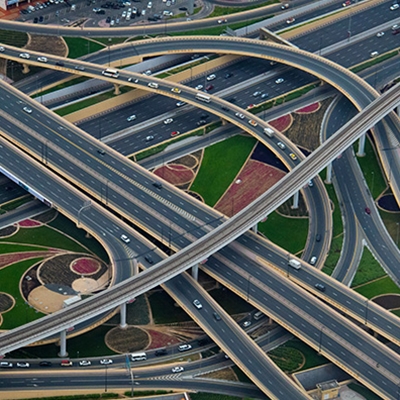
Event 136
Planet Assembly 3: Transport for the Future
A Thought Laboratory
– Creative Hub
Read moreBring your best ideas to this solutions-focused workshop session. Facilitated by sustainability entrepreneur Andy Middleton and joined by key speakers to be announced, we’ll look at the key issue of transport, discussing the scale of the issue and a range of solutions.
Speakers include remarkable individuals leading climate and biodiversity resilience projects, igniting hope and progress in their neighbourhoods and the wider community. We want you to share your ideas and to be inspired by those making a difference. Be part of the change in this two-hour thought laboratory.

Event 138
Robert Hardman
Charles III
– Wye Stage
Read moreFaced with family dramas, political crises and questions about the future of the monarchy in Britain and elsewhere, the new King has had no shortage of challenges to face including, most recently, his cancer diagnosis. Robert Hardman, writer and co-producer of the BBC documentary Charles III: The Coronation Year, gives his insight into the life of our current monarch, including looking at the role played by Queen Camilla and the monarchy’s role on the world stage.
Hardman has been a member of the BBC commentary team at all the major state occasions of recent times and is the author of several international bestsellers, including Queen of Our Times: The Life of Elizabeth II. His latest book is Charles III.
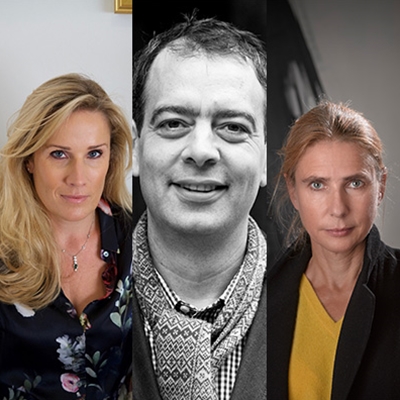
Event 147
Sarah Churchwell, David Runciman, Lionel Shriver and guests
The News Review
– Wye Stage
Read moreStart your day at Hay Festival with our daily news review. Join our leading journalists and special guests as they take us behind the headlines with insider perspectives, insights and an eye on what’s next. Strong coffee recommended! Among today’s guests are American literature and culture specialist Professor Sarah Churchwell, author of The Wrath to Come, and David Runciman, professor of politics at Cambridge University and author of Political Hypocrisy and The Confidence Trap, and Lionel Shriver, renowned journalist and author of We Need to Talk about Kevin and Mania. Chaired by The Independent chief books critic Martin Chilton.
In partnership with The Independent.

Event 150
John Crace talks to Sarah Churchwell
Depraved New World
– Global Stage
Read morePolitical sketch writer John Crace returns to Hay Festival with his blisteringly hilarious tour through the whirlwind of post-Brexit Britain, from the ousting of Boris to the dawn of a new era… sort of. Another month, another prime minister – how many have we been through now? Despite all the nonsense that has spewed forth from Westminster over the past two years, Crace’s brilliantly lacerating political sketches have provided some desperately needed relief. In Depraved New World: Please Hold, the Government will be With You Shortly, he takes in everything from Partygate, BoJo’s farewell, Liz Truss and Kwasi Kwarteng’s disastrous reign to the psychodrama of the Tory leadership contest(s), the return of Rishi Sunak, Suella Braverman’s hokey pokey and whatever lies ahead.

Event 152
Nicoleta Cinpoes, Sarah Nesteruk, Philip Parr and Lisa Stansbie
Guardians of Legacy: Preserving Identity and Heritage Amidst Conflict
– Wye Stage
Read moreOur panel assembles for a thought-provoking discussion that delves into the critical theme of preserving identity and heritage during times of war and conflict. Exploring the challenges inherent in safeguarding cultural treasures and articulating the profound importance of preserving collective history and culture, they show that community involvement and practical action are badly needed now. Nicoleta Cinpoes is Professor of Shakespeare Studies and Professor Lisa Stansbie is Pro Vice Chancellor Education, Culture and Society, both at the University of Worcester. Dr Sara Nesteruk is a filmmaker and senior lecturer in creative digital design at Manchester Metropolitan University. Philip Parr is Artistic Director of Parrabbola and Chair of the European Shakespeare Festivals Network.
In association with the University of Worcester

Event 154
Tom Burgis and Carole Cadwalladr talk to Oliver Bullough
The Law You Can Afford
– Global Stage
Read moreJournalism is the pursuit of the truth, and that’s what Tom Burgis and Carole Cadwalladr have spent their careers working towards. But what happens when people don’t want the truth to get out? Burgis and Cadwalladr talk to writer Oliver Bullough about the society-changing work they have done, and how strategic lawsuits against public participation (known as SLAPPS) are increasingly being used to tie up journalists’ time and funds to stop their work.
For three years, Burgis followed a lead that produced his new book Cuckooland: Where the Rich Own the Truth. He hunted down oligarchs and traced vast sums of money flowing between multinational corporations, ex-Soviet dictators and the West’s ruling élites. Guardian writer Cadwalladr exposed Cambridge Analytica’s role in mass-harvesting data to influence elections in the UK and US. Bullough is author of Butler to the World: How Britain Became the Servant of Tycoons, Tax Dodgers, Kleptocrats and Criminals.
Sponsored by Shepherds Ice Cream

Event 155
Jeffrey Boakye and Aleema Gray in conversation with Mykaell Riley
Making Music, Making History
– Wye Stage
Read moreMarking the publication of Boakye's Musical World, George the Poet's Track Record, and a major British Library exhibition, Beyond the Bassline:Black British Music, curated by Dr Gray and Dr Riley, our expert panel reflect on music as a political and shaping force, and on six centuries of African musical contribution to the UK and the world.
Co-organised with the British Library Eccles Institute for the Americas
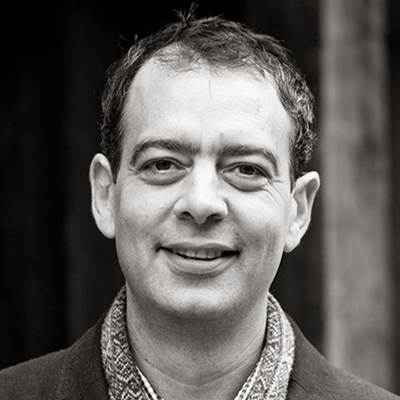
Event 159
David Runciman
How We Gave Control of Our Lives to Corporations, States and AIs
– Discovery Stage
Read more‘The Singularity’ is how Silicon Valley likes to describe the ultimate break point in human history: when we will come face to face with machines that have minds of their own. But what if this has already happened? Hundred of years ago, human beings started building the artificial entities that now rule our world. They are called states and corporations: immensely powerful robots, able to take decisions and act for themselves. They have made us richer, safer, healthier and more capable – and they may yet destroy us. David Runciman distils for us over 300 years of thinking about how to live with artificial agency in The Handover: How We Gave Control of Our Lives to Corporations, States and AIs. Runciman is Professor of Politics at Cambridge University and host of the Past Present Future podcast. He talks to writer and journalist Sarfraz Manzoor.
In association with the University of Cambridge
Supported by The British Academy
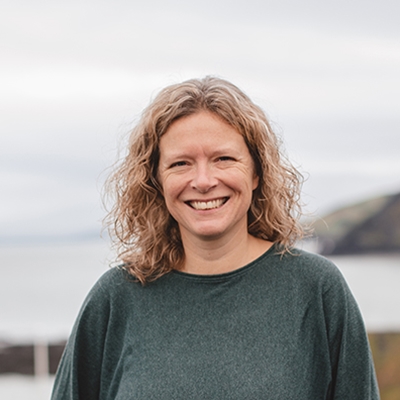
Event 164
Anwen Elias talks to Jennifer Wolowic
Doing Democracy Differently
– Meadow Stage
Read moreIn a world where trust in leaders falters and difficult conversations seem dangerous, Dr Anwen Elias, Co-director of the Centre for Welsh Politics and Society, and Dr Jennifer Wolowic, Principal Lead of Aberystwyth University Dialogue Centre, are launching ‘Doing Democracy Differently’. This project builds on current trends in participatory democracy and asks us to embrace our greatest resource – human creativity. Imagine community-led photography, collage and art shaping policies and institutions directly. Doing Democracy Differently aims to become a rallying call to transform the landscape of democracy, weaving together active citizenship, artistic expression and public policy. Join Elias and Wolowic as they embark on a journey to redefine how democracy unfolds.
In association with Aberystwyth University
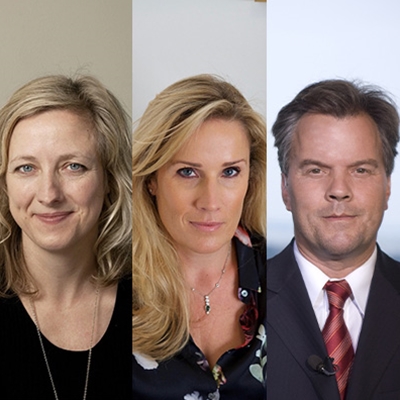
Event 165
Carole Cadwalladr, Sarah Churchwell and Matt Frei talk to Matthew D’Ancona
UK and US Elections
– Global Stage
Read moreIt’s election year in both the UK and the US, which means politicians trying to win our vote, endless scandals and arguments, and a search for the people and parties we think are going to work for us. Join the Observer’s Carole Cadwalladr, US historian Sarah Churchwell and television journalist Matt Frei for a round table discussion with journalist Matthew D’Ancona. They look at the contenders on both sides of the Atlantic, the challenges facing the new governments and what the implications of the elections are at home and abroad.
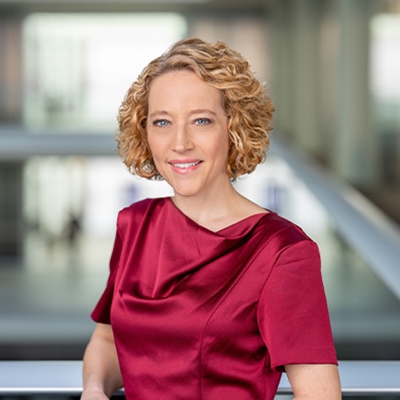
Event 167
Cathy Newman talks to Jude Kelly
Life Lessons from Women
– Discovery Stage
Read moreLearn lessons in life, work, love and more with Channel 4’s Cathy Newman, as she shares inspiration and wisdom from some of the world’s most acclaimed and influential women. Newman’s latest book The Ladder: Life Lessons from Women Who Scaled the Heights & Dodged the Snakes is inspired by her show on Times Radio, and brings together discussions between women, from politician Nicola Sturgeon to scientist Dame Jocelyn Bell Burnell and filmmaker Waad Al-Kateab.
Sponsored by Hay Camara Club with Carmarthen Camara Centre

Event 168
Robert Gildea, Amanda Powell and Richard Williams talk to Siân James
Coal and Community
– Meadow Stage
Read moreIt’s been 40 years since Arthur Scargill led the National Union of Mineworkers on one of the largest strikes in British history. Vilified by Margaret Thatcher’s government and eventually broken, Britain’s mining communities were changed forever. Academic Robert Gildea and husband-and-wife team Amanda Powell and Richard Williams reflect on the strike and its lasting impacts. Gildea’s Backbone of the Nation: Mining Communities and the Great Strike of 1984–85 explores mining communities from South Wales to Fife, drawing on interviews with miners and their families for this groundbreaking new history. Gildea is Professor Emeritus of Modern History at the University of Oxford. Powell and Williams both reported on the strike when it happened, and revisit it in their book Coal and Community in Wales. Award-winning journalist Powell’s account of key events and press photographer Williams’ striking images offer an in-depth look at life in the South Wales coalfield before and after the strikes.
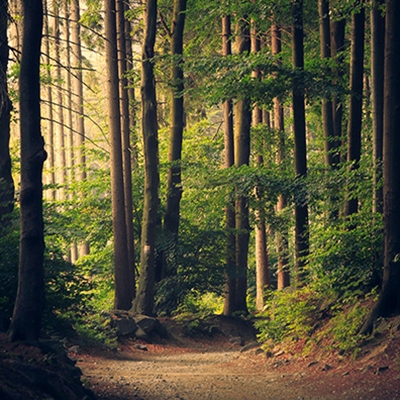
Event 170
Planet Assembly 4: Community Health for the Future
A Thought Laboratory
– Creative Hub
Read moreBring your best ideas to this solutions-focused workshop session. Facilitated by sustainability entrepreneur Andy Middleton and joined by key speakers to be announced, we’ll look at the key issue of health, discussing the scale of the issue and a range of solutions.
Speakers include remarkable individuals leading climate and biodiversity resilience projects, igniting hope and progress in their neighbourhoods and the wider community. We want you to share your ideas and to be inspired by those making a difference. Be part of the change in this two-hour thought laboratory.

Event 171
Matt Frei
The Christopher Hitchens Lecture: Can America Still be Saved?
– Discovery Stage
Read moreThis year’s Christopher Hitchens Lecture is delivered by Matt Frei, lead presenter of Channel 4 News’ award-winning global coverage. Frei takes an in-depth look into America, analysing whether and how the country can still be saved from itself. His book Only in America chronicled the presidency of George W Bush, and he has interviewed five American presidents, including Trump. While based in the US he presented the BBC Radio 4 programme Americana.

Event 177
Peter Apps talks to Matthew D’Ancona
Deterring Armageddon: A Biography of NATO
– Spring Stage
Read moreNATO this year marks its 75th anniversary, and discussions around its purpose, achievements, faults and usefulness have never been louder. Journalist Peter Apps takes a look at the history of NATO, from the Korean War to the pandemic, the Berlin and Cuba crises, and the chaotic evacuation from Kabul.
Peter Apps is global defence correspondent for Reuters news agency and is currently on sabbatical as executive director of the Project for Study of the 21st Century (PS21). Apps reported from Sri Lanka during the civil war between the government and Tamil Tiger rebels. In September 2006, he broke his neck in a minibus crash while covering the conflict, leaving him largely paralysed from the shoulders down. He returned to work in a wheelchair nine months later, using voice recognition software to resume his writing career. Of the 20 or so countries he has reported from, more than half have been since the injury.

Event 181
Sebastian Coe talks to Matthew d’Ancona
Sports Day: Seb Coe’s Guide to Sports, its Politics and Future
– Global Stage
Read moreLord Sebastian Coe has unrivalled experience of the world of sport, as a double Olympic gold medallist, architect of the London 2012 Olympics, President of World Athletics, politician, businessman and champion of sport as a path to individual fitness, national pride and international collaboration. He talks to journalist Matthew d’Ancona about the ever-expanding role of sport in 21st century society, and the controversies and opportunities that lie ahead.
Sponsored by the Sinclair Group
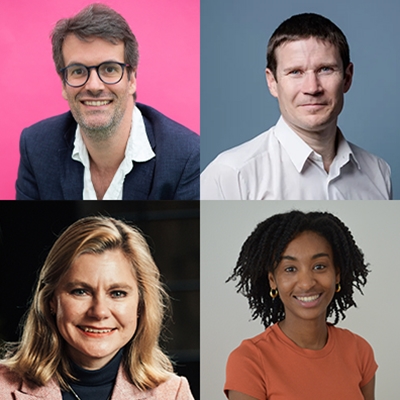
Event 182
Marcus Brigstocke, Gavin Francis, Justine Greening and Layal Liverpool
The News Review
– Discovery Stage
Read moreStart your day at Hay Festival with our daily news review. Join our leading journalists and special guests as they take us behind the headlines with insider perspectives, insights and an eye on what’s next. Strong coffee recommended!
Today’s guests include comedian Marcus Brigstocke, the British Antarctic Survey’s physician Gavin Francis, former Secretary of State for Education Justine Greening and science journalist Layal Liverpool.
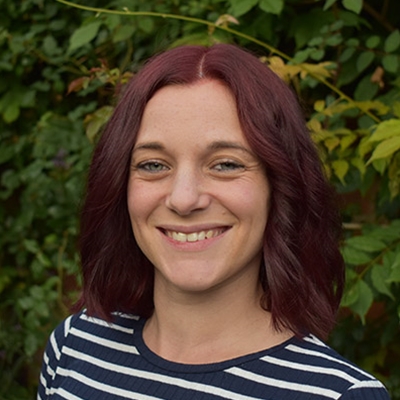
Event 183
Imogen Peck
Memory Wars: The Lasting Legacy of Britain’s Civil Wars
– Wye Stage
Read moreThe historian of the mental afterlife of conflict examines the civil wars that engulfed Britain in the mid-seventeenth century – the most destructive in the island’s history. The wars left lasting scars on the British cultural and political imagination, and the memory of that turbulent decade in the 1600s continues to haunt the politics of the present. Dr Imogen Peck asks what, in a time of global instability, we might learn from the successes and failures of early modern states, exploring some of the surprising parallels between early modern and modern approaches to cultural memory and issues of national reconciliation. Author of Recollection in the Republics, Peck is Assistant Professor in British History at the University of Birmingham and Director of the Centre for Midlands History and Cultures.
In association with the University of Birmingham
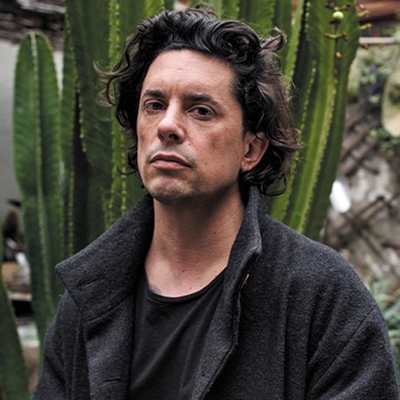
Event 188
Benjamín Labatut talks to Stephen Fry
The Maniac
– Discovery Stage
Read moreChilean author Benjamín Labatut shines a light on the ethics of science in a disturbing triptych tracing the path from the fundamentals of mathematics to the delusions of artificial intelligence. It focuses on John von Neumann, a titan of science and a Hungarian wunderkind with exceptional mathematical powers. He designed the world's first programmable computer, invented game theory, pioneered AI and helped create the atomic bombs that destroyed Hiroshima and Nagasaki. But when illness unmoored his mind, his work pushed further into areas beyond human control.
Blending fact and fiction, Labatut takes us to the frontiers of rational thought, where invention outpaces human understanding and leads us to the brink of Armageddon. He talks to Hay Festival President Stephen Fry about The Maniac, his first book in English.
Supported by the British Council

Event 191
Gary Lineker talks to David Olusoga
Sports Day: The Rest is Lineker
– Global Stage
Read moreOne of football’s most successful players ever, Gary Lineker’s latest act has seen him launch a podcasting empire. As founder of Goalhanger Productions, Lineker produces hit shows The Rest is History, The Rest is Entertainment, The Rest is Football and The Rest is Politics, adding much-needed nuance and insight into our national discourse. Join the England legend and Match of the Day presenter for a wide-ranging discussion of his career in sport, media and storytelling. He talks to historian and broadcaster David Olusoga.
Sponsored by Partners&
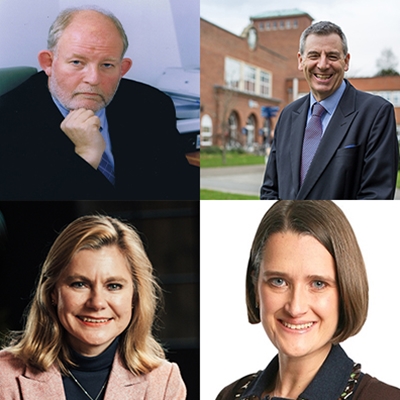
Event 193
Charles Clarke, Lisa Stansbie, Justine Greening and Rachel Sylvester
A Manifesto for Education
– Meadow Stage
Read moreWhat should a future government’s manifesto and action for education include? Join the conversation with two former Secretaries of State for Education and the Times political columnist, Chair of the highly influential Times Education Commission, together with Professor Lisa Stansbie, Pro Vice Chancellor Education, Culture and Society at University of Worcester, whose most recent independent, official inspection report of its teacher training provision begins: “Trainees benefit from an exceptional learning experience at the University of Worcester. This experience instils in them a deep-rooted commitment to making a difference to the lives of the children and young adults in the communities they serve.”
In association with the University of Worcester

Event 203
Kenny Ethan Jones, Wendy Moore and Alana S Portero in conversation
The Queer Experience
– Wye Stage
Read moreFrom manifesto to biography and from historical fiction to coming-of-age story, four authors of books centring on queer people discuss their work. Kenny Ethan Jones’ book Dear Cis(Gender) People is a powerful call to arms empowering cisgender people to be better allies. Wendy Moore’s Jack and Eve tells the real story of a jobbing actress who became Emmeline Pankhurst’s chauffeur and mechanic, and the daughter of a Scottish baron, who became public faces of the suffragette movement. Alana S Portero is a Spanish writer, poet and transgender activist whose novel Bad Habit explores coming of age in 1980s Spain, a place of vast social inequality but also one where social change was possible, and all moderated by Welsh lesbian writer Rachel Dawson whose novel, Neon Roses has been short-listed for Wales Book of The Year.
Supported by AC/E Acción Cultural Española and in partnership with the Service95 Book Club
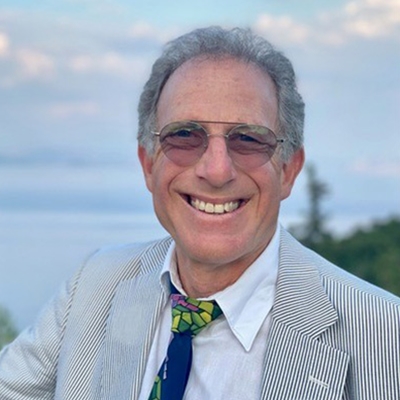
Event 205
Henry Engelhardt talks to Antonia Garrett-Peel
Be a Better Boss
– Meadow Stage
Read moreThere is no one who has a bigger impact on the mood of a workplace than the boss. But how do you ensure you’re one of the good ones, and not a figure that everyone complains about? Starting with his own background, Henry Engelhardt shares his advice on how to be a better boss, in conversation with Antonia Garrett-Peel, Senior Writer at Management Today. With almost 50 years’ working experience, starting with Poochie’s Hot Dogs at age 13, Engelhardt is a founder and CEO emeritus of Admiral Group, based in Cardiff. It is the largest private car insurer in the UK and the only FTSE 100 company in Wales.
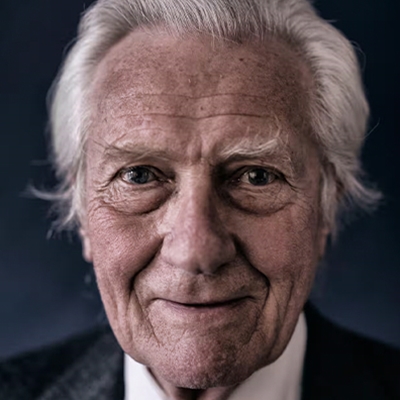
Event 459
Michael Heseltine talks to Matthew d'Ancona
State of the nation
– Global Stage
Read moreOn the eve of a General Election, former Deputy Prime Minister the Rt Hon the Lord Michael Heseltine CH joins us for a state of the nation discussion with journalist Matthew d'Ancona. Lord Heseltine enjoyed one of the most colourful and creative careers of late 20th-century British politics. If the top office at Westminster eluded him, nothing much else did. He was a Cabinet Minister in various departments from 1979 to 1986 and 1990 to 1997 and Deputy Prime Minister from 1995 to 1997. He later served as an advisor to the Secretary of State for Communities and Local Growth, and as a Commissioner on the National Infrastructure Commission (October 2015 to March 2017). He is the founder and Chairman of the Haymarket Group. Together with his wife he has created an outstanding garden around their home in Northamptonshire and co-authored Thenford: The Creation of an English Garden.
Sponsored by Baskerville Hall Hotel
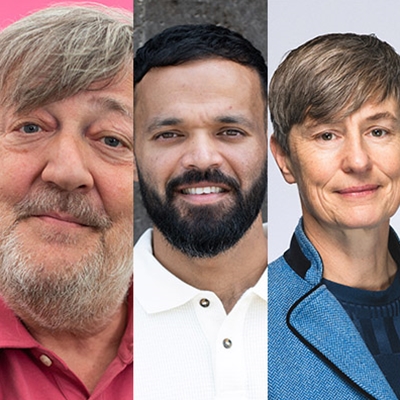
Event 207
Stephen Fry, Azeem Rafiq and Claire Taylor talk to Adam Rutherford
Sports Day: Not a Level Playing Field
– Discovery Stage
Read moreGreen grass, blue skies, white flannels and the gentle thwack of leather on willow; the quintessential image of cricket. The so-called ‘gentleman's game’ developed with the principle of fair play at its heart. But something is rotten at the core. The Independent Commission for Equity in Cricket Report in 2023 found that cricket is riddled with structural and institutional racism, sexism, classism and elitism. Fry, Rafiq, Rutherford and Taylor discuss the big issues, examine the systemic biases and scrutinise the ongoing solutions to render the second most popular sport on Earth a game for everyone.
Stephen Fry is former President of the MCC and a lifelong cricket fan. Azeem Rafiq is a former Yorkshire County cricketer and England youth captain. Claire Taylor MBE is a World Cup-winning English cricketer. They talk to Adam Rutherford, scientist, author and player for The Authors XI cricket team.
Sponsored by Look - Supporting Visually Impaired Children to Thrive
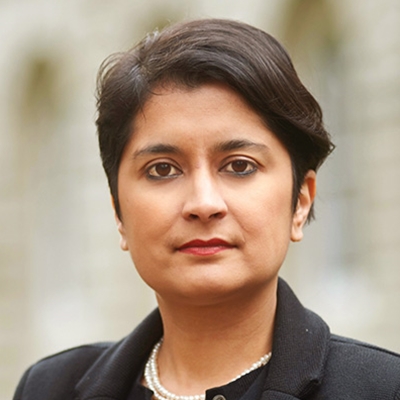
Event 208
Shami Chakrabarti talks to Rosie Boycott
Human Rights: The Case for the Defence
– Global Stage
Read moreThe leading human rights lawyer, campaigner and former Shadow Attorney General for England and Wales argues for the vindication of human rights, attacked by opponents from across the political spectrum and populist and authoritarian movements worldwide. After the devastation of the Second World War, the international community came together to enshrine fundamental rights to refuge, health, education and living standards, for privacy, fair trials and free speech, and outlawing torture, slavery and discrimination. Their goal was greater global justice, equality and peace. That goal is now threatened by wars, inequality, new technologies and climate catastrophe. Outlining the historic struggles for human rights, Chakrabarti is an indispensable guide to the law and logic underpinning human dignity and universal freedoms. For human rights to survive, they must be far better understood by us all.